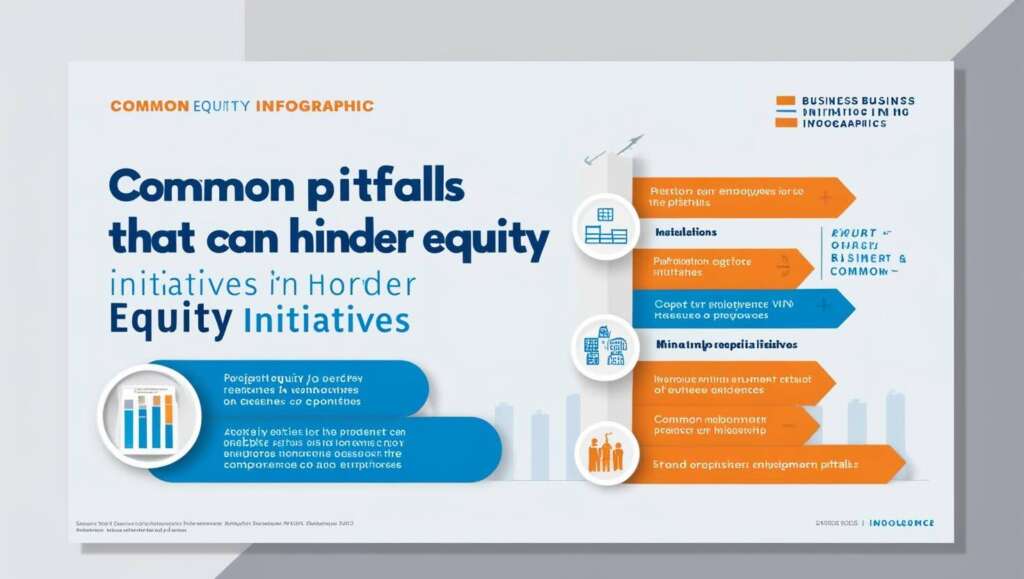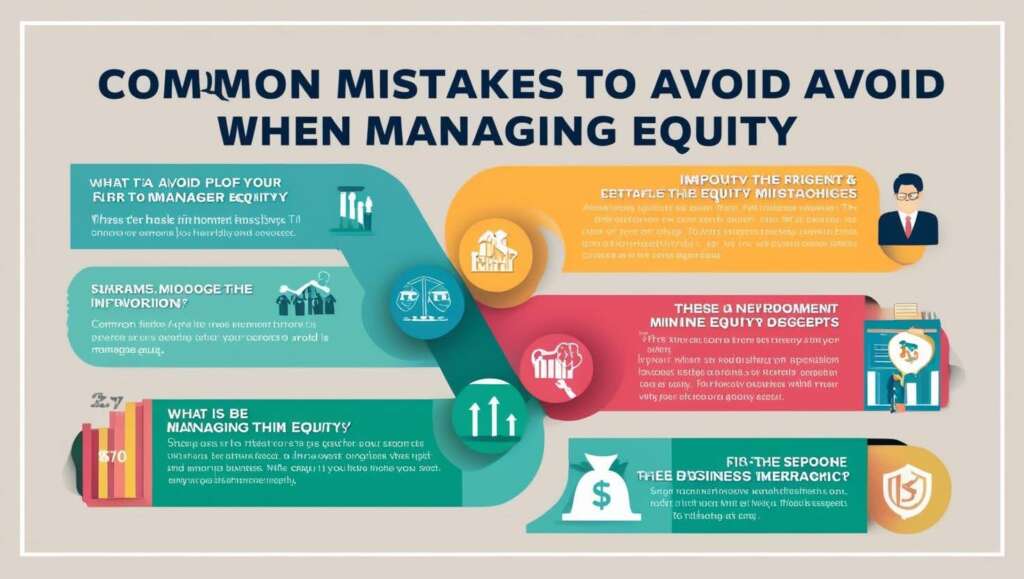Equity is a powerful tool for driving business growth, but like any powerful asset, it can work for you or against you depending on how you leverage it. For business owners and entrepreneurs, understanding equity is crucial to achieving long-term success. While debt financing often gets the spotlight, equity financing is an equally potent method for raising capital, attracting investors, and scaling operations. However, it’s easy to overlook the complexities of equity, which can lead to mistakes that negatively impact your business. In this article, we’ll break down how to harness equity’s potential while avoiding the common pitfalls that can turn it into a disadvantage. Whether you’re a startup founder seeking funding or a seasoned entrepreneur looking to optimize your company’s growth, knowing how to make equity work for you is essential.
What is Business Equity?
Equity in business refers to the ownership value that stakeholders hold in a company. It represents the residual value of a company after all liabilities are paid off. In simple terms, equity is what owners and shareholders “own” after debts are settled. It can take different forms, including common stock for shareholders, retained earnings for the business itself, or owner’s equity for sole proprietors. Equity plays a vital role in the financial structure of a business, as it provides the foundation for growth and stability.
Types of Equity
- Owner’s Equity: This refers to the net assets that the business owner retains after debts are deducted. For sole proprietors and small businesses, this is the amount they would walk away with if the business was liquidated.
- Shareholder’s Equity: In corporations, equity is split among shareholders. The value of a share represents part ownership in the company.
- Retained Earnings: This is the portion of profit that a company chooses to reinvest into the business rather than distribute to shareholders. It reflects the company’s ability to generate internal capital.
Debt vs. Equity Financing
Equity financing involves raising capital through the sale of ownership stakes in the company, such as issuing shares. In contrast, debt financing involves borrowing funds that need to be repaid with interest. The major difference is that equity does not require repayment, but it dilutes ownership. While debt financing increases financial obligations, it allows the owner to retain full control of the company.
Why Equity is Crucial
Equity is more than just a financial term; it’s a strategic asset. It provides businesses with the ability to raise capital without the burden of debt. By offering equity to investors, businesses can tap into new financial resources to scale their operations. Furthermore, well-managed equity allows companies to grow sustainably while preserving their long-term viability.
Key Takeaway: Understanding the basics of equity is essential for navigating the financial landscape. Whether it’s owner’s equity or shareholder’s equity, knowing how each form impacts your business can help you make informed financial decisions.
The Power of Equity in Growing Your Business

Equity is often the key to unlocking growth potential in a business. When used strategically, it can provide the funding needed to expand operations, enter new markets, and accelerate innovation. However, as with any tool, understanding how to wield it correctly is crucial to making it work for you.
Leveraging Equity for Expansion
One of the primary benefits of equity financing is its ability to fuel business expansion without the immediate pressure of repaying loans. By offering ownership stakes to investors, businesses can raise the necessary funds to invest in new technology, hire staff, or expand into new markets. This capital injection can lead to significant growth, as it frees the company from the financial strain of taking on debt.
For example, tech startups often rely heavily on venture capital funding, which involves giving up a portion of equity in exchange for growth capital. This funding allows the startup to focus on product development and customer acquisition without the burden of monthly debt repayments.
The Risk-Reward Balance of Equity Financing
While equity can provide much-needed capital, it also comes with risks, especially when the ownership of the business is shared. The more equity that is given away, the less control the original owner has over decision-making. It’s a trade-off that requires careful consideration. In some cases, entrepreneurs may find themselves sacrificing too much equity, leading to a loss of control and decision-making power.
To maintain a balance, business owners should evaluate how much equity they are willing to give up based on the investment needed and the level of control they wish to retain. A strategic approach would involve creating clear agreements that outline decision-making processes, voting rights, and the eventual exit strategy.
Attracting Investors and Setting Expectations
Equity financing is particularly useful for attracting investors, who are often looking for high-growth opportunities. Whether it’s angel investors, venture capitalists, or institutional investors, offering equity can provide the necessary incentives for them to invest in your business. However, investors typically expect a return on their investment. This means they will likely want to be involved in the company’s growth strategy and decision-making processes.
For instance, when seeking venture capital funding, business owners should be prepared for investors to require equity in exchange for capital. This usually means giving up some level of control over business decisions. However, investors often bring more than just money to the table—they may offer expertise, networks, and connections that can help accelerate the business’s growth.
Real-World Examples of Equity Funding Success
Companies like Facebook and Uber have successfully used equity financing to grow their businesses exponentially. In the early stages, these companies gave up a significant amount of equity in exchange for funding, allowing them to scale rapidly. While the founders gave up a portion of ownership, they ultimately benefited from the expertise and capital that helped drive their businesses to success.Key Takeaway: Equity can be a powerful growth tool when used correctly. It enables businesses to scale, attract investors, and expand operations, but it requires careful consideration of the trade-offs between ownership and growth potential.
Common Pitfalls: When Equity Can Work Against You

While equity can be a powerful growth tool, it also has the potential to work against you if not managed properly. Business owners must be cautious of common pitfalls, such as over-leveraging equity or giving away too much control to investors.
Over-Leveraging: The Risks of Too Much Equity Financing
One of the biggest dangers of equity financing is over-leveraging. This occurs when a business gives away too much of its equity in exchange for capital. While this may provide immediate financial relief, it can lead to significant problems down the line. Over-dilution of ownership can result in a loss of control, as investors gain more influence over business decisions.
For example, if a startup gives away too much equity early on, the founder may find themselves in a position where they no longer have the authority to make key decisions about the business. In the worst-case scenario, this could lead to a loss of direction or vision for the company.
Equity vs. Debt: Finding the Right Balance
When deciding between equity and debt financing, it’s important to find the right balance. While equity can provide valuable growth capital, it comes with the cost of diluting ownership. On the other hand, debt financing allows business owners to retain full control but requires regular repayments and interest.
Business owners should evaluate their long-term goals and financial projections before deciding how to finance their operations. In some cases, a combination of both debt and equity financing may be the best solution. This hybrid approach allows businesses to raise capital while maintaining some control over ownership.
The Impact of Over-Equity Financing on Long-Term Profitability
Another pitfall of excessive equity financing is its potential impact on long-term profitability. While taking on investors can provide immediate funding, it can also mean sharing future profits with those investors. If too much equity is given away, the business owner may find themselves with a much smaller portion of the profits in the future.
As businesses scale, this can lead to a situation where the original owner’s stake is so diluted that it no longer reflects the value they’ve created. The result is a loss of control over both the company’s direction and its financial outcomes.
Key Takeaway: While equity financing can be an invaluable tool for growth, it’s important to avoid over-diluting ownership. Striking the right balance between equity and control is key to ensuring that equity works for you and not against you.
How Equity Can Work for You: Strategies for Effective Management
Understanding how to make equity work for you requires more than just securing funding—it involves a strategic approach to managing and using equity to fuel your company’s growth. From managing investor relations to balancing ownership, the key lies in maintaining control while leveraging the power of external capital. Let’s explore strategies that ensure equity remains a strong asset for your business.
Strategic Equity Distribution: Finding the Right Investors
The first step in managing equity effectively is choosing the right investors. Not all capital is created equal, and securing investment from investors who align with your company’s values, vision, and growth strategy is crucial. When distributing equity, business owners should consider not only the amount of funding provided but also the long-term partnership.
One of the most successful strategies for ensuring that equity works for you is to negotiate terms that provide value beyond just money. Look for investors who can bring expertise, connections, and industry insights to the table. This can add immense value to your business that goes far beyond the initial capital raised.
For example, choosing venture capitalists or angel investors who have experience in scaling startups can provide your company with critical guidance as you navigate growth stages. These investors may also have access to networks that open up opportunities for partnerships, joint ventures, or further investment rounds.
Preserving Control with Strategic Ownership Shares
Another effective strategy for managing equity is to structure ownership shares in a way that allows you to maintain control of the business while still attracting investors. This can be achieved by issuing different classes of shares, such as preferred stock, which may provide investors with a financial stake in the business without giving them voting rights.
By doing this, you can retain the decision-making power needed to steer your company’s vision while still providing investors with a profitable return on their capital. This allows you to balance the need for external investment with the desire to preserve control over your business.
Setting Clear Expectations with Investors
Clear communication is essential when it comes to managing equity and investor relationships. It’s vital to establish clear expectations about the role investors will play in the business, their level of involvement, and the timelines for potential exit strategies.
Having a well-defined exit strategy is particularly important for both business owners and investors. This ensures that everyone is aligned on the long-term goals of the business and that both parties understand how and when profits will be realized. Whether the exit involves a public offering, an acquisition, or other strategies, having these terms in place upfront can help prevent misunderstandings and disputes down the line.
Key Takeaway: Effectively managing equity requires a strategic approach to distributing ownership, maintaining control, and communicating with investors. By choosing the right investors and setting clear expectations, you can ensure that equity remains a positive force for your business.
Common Mistakes to Avoid When Managing Equity

While equity can provide businesses with valuable resources, it also comes with risks that need to be carefully managed. Understanding the common mistakes that business owners make when dealing with equity is crucial to ensuring that it works for you rather than against you.
Over-Diluting Ownership
One of the most common mistakes business owners make is over-diluting their ownership stake in the business. While raising capital through equity financing can be an effective growth strategy, giving away too much equity can leave you with a smaller share of the business and diminish your control over decision-making.
Over-dilution can occur when businesses give away large amounts of equity to early investors, such as venture capitalists or angel investors, in exchange for quick funding. While this may seem like a good strategy to scale the business quickly, it can result in a situation where the business owner no longer has the authority to make key decisions. It’s important to carefully evaluate how much equity you’re willing to give up and to maintain a balance that allows you to keep control of your company’s direction.
Not Accounting for Future Funding Needs
Another mistake business owners often make is failing to account for future funding needs when distributing equity. In the early stages of a business, it may seem tempting to give away large chunks of equity to raise funds quickly, but this can limit your ability to raise additional capital in the future.
Investors may be reluctant to invest in a company where the founders have already given away a significant portion of equity. In the worst-case scenario, over-dilution can make it difficult to raise subsequent rounds of funding, as potential investors may see the remaining equity as too small of a stake to make their investment worthwhile.
To avoid this pitfall, business owners should plan for future funding rounds and leave enough equity for future investors. This can be achieved by setting aside an option pool or retaining a portion of ownership for future rounds of funding.
Lack of Exit Strategy
A common mistake is failing to develop a clear exit strategy when accepting equity financing. Without a defined exit plan, business owners and investors may have differing expectations about the future of the company. This can create tension and lead to difficulties when it comes time to sell, go public, or acquire new funding.
A well-developed exit strategy is essential to maintaining a positive relationship with investors and ensuring that everyone is aligned on the business’s long-term goals. Whether you plan to sell the company, pursue a public offering, or transition ownership to a partner or family member, having a clear exit strategy in place can help you navigate these transitions smoothly.
Key Takeaway: Avoiding common mistakes such as over-diluting ownership, failing to account for future funding needs, and neglecting to set an exit strategy is crucial to making equity work for you. Strategic planning and careful management are essential to maximizing the benefits of equity financing.
The Role of Equity in Building a Sustainable Business Model
Equity plays a critical role in building a sustainable business model. It’s not just about raising funds but about ensuring long-term profitability and stability. Whether you are bootstrapping or taking on investors, the way you manage equity will affect everything from cash flow to strategic decisions.
Leveraging Equity for Business Growth
Equity is a tool that, when managed properly, can significantly contribute to your business’s growth. It allows you to invest in key areas like marketing, talent acquisition, research and development, and scaling operations. By using equity to fund these growth initiatives, you’re essentially building a foundation for long-term success without the pressure of repaying loans or accruing debt.
For example, in the early stages of your business, you might use equity to bring in high-caliber employees or invest in cutting-edge technology that will give you a competitive edge. The right use of equity allows you to grow your business without being constrained by the traditional limits of debt financing, enabling you to focus on scaling your operations without the constant pressure of servicing interest payments.
Building Trust and Investor Relationships
When equity is managed transparently, it can help foster strong, trusting relationships with investors. Transparent equity distribution ensures that everyone is on the same page, understanding not just the financial aspects, but also the strategic direction of the business. This is particularly important if you plan on raising additional rounds of funding, as investors will want to ensure they are working with a business that operates with integrity and foresight.
Furthermore, by being proactive in managing equity, business owners can develop strong bonds with their investors. This is beneficial, as investors who trust you and believe in your vision are more likely to offer advice, connections, and additional funding when necessary.
Key Takeaway: Equity is essential to building a sustainable business model by providing the resources necessary for growth, as well as fostering strong relationships with investors. Effective equity management ensures that your company can scale while maintaining control and trust.
How to Maximize the Benefits of Equity

Maximizing the benefits of equity requires not only a smart approach to distribution but also a deep understanding of how equity impacts both short-term and long-term business strategies. The following tips will help you ensure that equity remains a powerful tool in your business toolkit.
Focus on Equity-Based Compensation
One of the most effective ways to maximize equity is through offering equity-based compensation to key employees. This could be in the form of stock options, restricted stock units (RSUs), or other equity incentives. By doing so, you align the interests of your employees with the success of the company, encouraging them to work towards the company’s growth and profitability.
Equity-based compensation also helps attract top-tier talent, particularly in competitive industries. High-quality candidates are often drawn to the potential upside of equity in a company, which may offer them higher long-term rewards compared to a traditional salary.
Plan for Future Equity Events
Another way to maximize the benefits of equity is to plan for future equity events, such as stock splits, equity rounds, or acquisitions. Having a clear strategy in place for when these events occur can ensure that your company remains on the right track. This includes deciding how much equity to set aside for future funding rounds or offering early employees an opportunity to cash out during an acquisition or IPO.
It’s important to communicate your plans to investors and stakeholders so they understand how their shares will be affected by these events. This transparency helps prevent misunderstandings and strengthens the relationship between you and your investors.
Monitor the Market and Valuation Trends
Lastly, it’s essential to monitor your company’s valuation and market conditions regularly. A rise in valuation can create new opportunities for raising capital or acquiring strategic partnerships. On the other hand, a decrease in valuation can put pressure on equity holders, especially if you’re looking to raise funds or issue additional shares.
By keeping an eye on market trends and adjusting your equity strategies accordingly, you can ensure that your equity remains a valuable tool for achieving your business goals.
Key Takeaway: To maximize the benefits of equity, it’s important to leverage equity-based compensation, plan for future equity events, and monitor market trends. By doing so, you can use equity to fuel growth, retain top talent, and strengthen your company’s position in the market.
Conclusion: Equity as a Strategic Asset
Equity, when managed correctly, can be one of the most powerful tools at your disposal. It provides the funding necessary for growth while giving you the flexibility to scale your business without the constraints of debt. The key to making equity work for you lies in strategic distribution, maintaining control, and leveraging it to build a sustainable business model.
By following the strategies outlined in this article, you can navigate the complexities of equity, ensuring that it remains an asset for your business rather than a liability. Whether you’re looking to grow your company, attract investors, or retain top talent, understanding the ins and outs of equity management is crucial to your business’s long-term success.
Key Takeaway: Equity should be seen not just as a financial tool but as a strategic asset. When used correctly, it can enable growth, attract investment, and strengthen your business for the future.
FAQs
- What is the best way to avoid equity dilution?
- The best way to avoid dilution is to plan your funding rounds carefully and negotiate equity terms that allow for control retention, such as issuing preferred stock or setting up an option pool for future investors.
- How can I make equity work for me in the early stages of my business?
- In the early stages, focus on raising the right capital from investors who can bring value beyond money, such as industry expertise or connections. Be mindful of the equity you give away.
- What are the risks of giving away too much equity?
- Giving away too much equity can result in loss of control over your business, limited decision-making power, and difficulty raising future capital.
- Can equity-based compensation help attract top talent?
- Yes, equity-based compensation is a powerful tool for attracting and retaining high-quality employees who are motivated by the potential long-term rewards of owning a stake in the company.
- What are the advantages of having a clear exit strategy for equity holders?
- A clear exit strategy ensures alignment between business owners and investors, providing a roadmap for how equity will be liquidated and ensuring everyone is on the same page.

